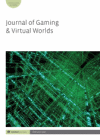- Home
- A-Z Publications
- Journal of Gaming & Virtual Worlds
- Previous Issues
- Volume 4, Issue 3, 2012
Journal of Gaming & Virtual Worlds - Volume 4, Issue 3, 2012
Volume 4, Issue 3, 2012
-
-
Digital war: An empirical analysis of narrative elements in military first-person shooters
More LessAuthors: Johannes Breuer, Ruth Festl and Thorsten QuandtABSTRACTComputer and video games have always been, and remain, substantial parts of the so-called military-entertainment complex. The genre of first-person shooters (FPS) has been closely associated with the military due to its content and gameplay mechanisms. This article presents a content analysis of narrative elements in military-themed FPS games from 1992 to 2010 (N=189). The results show that some conflicts, locations and factions appear more frequently than others. The games portray wars and conflicts from an almost exclusively US-American or western perspective, with the degree of realism differing based on the respective topic and setting. The findings are discussed with regard to the potential effects of military-themed FPS on their players as suggested by the concept of narrative persuasion.
-
-
-
A matter of perspective: The impact of first- and third-person perspective on the perception of virtual group discussions
More LessAuthors: Laura Hoffmann, Nina Haferkamp, Jennifer Klatt, Anh Lam-Chi and Nicole C. KrämerABSTRACTThe usage of virtual environments (VEs) in organizational settings has become increasingly important. Virtual group meetings, for instance, enable discussions between people who work far away from each other without requiring travel. However, what remains open is the question of whether the technology itself impacts decision making within the group. The present study used a (quasi-)experimental design to test whether manipulating the mediated perspective on a virtual meeting influences decision making in virtual groups. A total of 78 participants engaged in virtual group discussion, each comprising four people, who were visualized by avatars. During the virtual meeting participants either looked through the eyes of their avatars (first-person perspective) or viewed the back of their avatars (third-person perspective) in the VEs. Results indicated that participants who were visualized in the first-person perspective reported a higher involvement in the group discussion and also more satisfaction with the group decision than participants in the third-person perspective.
-
-
-
‘No one-handed typing’: An exploration of gameness, rules and spoilsports in an erotic role play community in World of Warcraft
More LessBy Ashley BrownABSTRACTThis article merges classic and contemporary texts in the study of games as tools to explore how endogenous and exogenous rules are created and maintained in a community of North and Central American erotic role players in the massive multiplayer online role playing game World of Warcraft. The data for this article comes from nine months of immersive fieldwork on a role-playing server in which participant observation, case studies and in-depth interviews were used to generally explore the topic of erotic play within the game. The data of relevance to this article comes from two in-game interviews as well as observations on the guild’s forum. The first interview excerpt comes from a discussion in which the leaders of the guild were asked to recount their experiences enforcing the guild’s rules, whilst the second excerpt comes from an interview with a player who discussed the endogenous and exogenous rules she has created to ensure that her erotic play contributes to the narrative of her character. Within the guild forum, observations came from a message board dedicated to erotic role play (ERP), which includes rules that outline acceptable erotic behaviour. Through an analysis of the two player interviews, as well as the guild’s forum rules, an argument develops for viewing ERP as a game in and of itself with its own rules and goals separate to those of the World of Warcraft. In viewing ERP as a game, we also view the processes used by its players to define and create their own goals for play. The article will conclude with a discussion on the functionality of rules like ‘no one-handed typing’ situated within the larger context of World of Warcraft.
-
-
-
Hanging out is hard to do: Methodology in non-avatar environments
More LessABSTRACTEthnography is now a well-established research methodology for virtual environments,and the vast majority of accounts have one aspect in common, whether textual or graphic environments – that of the embodied avatar. In this article, I first discuss the applicability of such a methodology to non-avatar environments such as Eve Online, considering where the methodology works and the issues that arise in its implementation – particularly for the consideration of sub-communities within the virtual environment. Second, I consider what alternative means exist for getting at the information that is obtained through an ethnographic study of the virtual environment. To that end, I consider the practical and ethical implications of utilizing existing accounts, the importance of the meta-game discourse, including those sources outside of the control of the environment developer, and finally the utility in combining personal observations with accounts of other ethnographers, both within and between environments.
-
Most Read This Month


